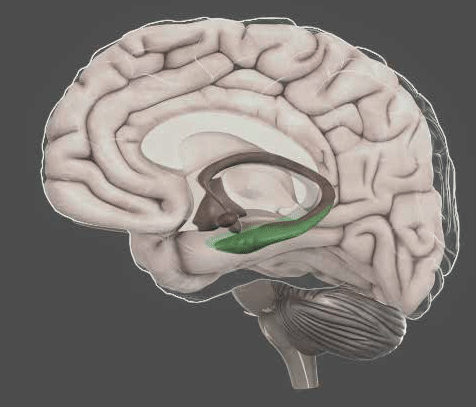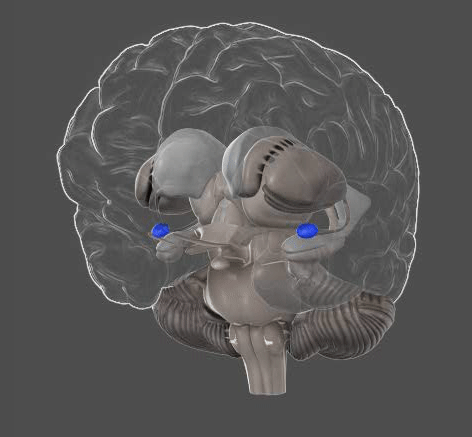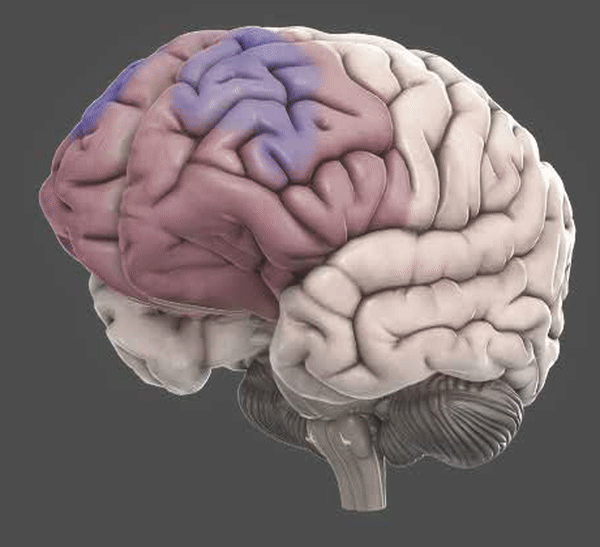

Brain Structures Involved in Depression
 The HippocampusThe hippocampus plays an important role in memory formation, especially memories of your personal experiences. Brain imaging studies show that people who have experienced multiple episodes of depression had decreased volume of their hippocampi. |  The AmygdalaThe amygdala is active during emotional reactions, decision-making and memory consolidation. It plays a role in the retrieval of memories that have an emotional component. For example, it would be particularly active when a person is thinking about a recent breakup. |  The Prefrontal CortexThe prefrontal corex plays a role in many functions: some include memory, attention, decision-making and self-awareness. but when a person has depression the most affected functions are regulation of emotion, motivation and response to perceived stress. |
|---|
Images by Cold Spring Harbour Lab, ©2009

Inside the Brain
Neurons and neurotransmitters interact with each other to form our perception of the world.
Neurotransmitters Involved in Depression
What are neurotransmitters?
Neurotransmitters are chemicals that allow communication between cells of the brain and levels of these transporters varies throughout the day. For example, serotonin levels rise when we eat, hug, exercise, and see bright lights. As is the case with depresion, we may feel and behave differently when there are unusually high or unusually low levels of neurotransmitters.
Which neurotransmitters are involved in major depressive disorder?
The neurotransmitters involved with depression include norepinephrine, dopamine, acetylcholine, GABA, glutamate and serotonin. Most antidepressant drugs try to influence the activity levels of these neural messengers to relieve depressive symptoms, most often feelings of low mood.
Researchers have found that the various neurotransmitters relate to different symptoms of MDD. For instance, very low levels of dopamine is associated with symptoms of low energy, loss of pleasure and loss of motivation. On the other hand, very low levels of serotonin is associated with symptoms of guilt, irritability, anxiety and fear.

Neurons make up the tissue of the brain, and in between the neurons are spaces called synapses. Neurotransmitters transport ions across the synapse to help transmit information from one neuron to another.
Causes of Depression
To learn more about how different factors interact to cause depression click here!
How significant is the influence of genetics on depression?
Research on the heritability of depression shows that there is no single gene that can identify whether a person is at risk for depression; depression is likely affected by the interactions between various different genes.
Having a family member that has suffered from depression moderately increases the chances that you will have depression. Some studies on twins who share 100% of their DNA show that one twin having depression increases the risk that the other twin develops depression as well. However, genes don't guarantee that a person will develop depression: these studies have also observed cases in which one twin suffers from depression and the other twin does not.
What kind of personal experiences increase the risk of depression?
Correlational studies show that individuals who have experienced abuse (emotional, physical or sexual) or have suffered from other physical or mental illnesses also developed depression. An example of abuse is bullying. Researchers from Duke university conducted a study showing that bullying during adolescence increases the risk of developing depression in adulthood for both individuals being bullied and individuals who bullied others. In addition, a review of physical illnesses related to depression pointed out that chronic pain or fatigue, heart disease and stroke are commonly observed with depression. Previous experience with anxiety disorders also highly increases the risk for depression, and depression is often treated alongside with anxiety.
Major life events, even positive events like moving to a new place or getting married can trigger depression. Stress in general can be a contributing factor to depression, and most Canadian universities implement workshops for students about stress management strategies. Different sources of stress include interpersonal conflict, academic pressures, starting university or moving away from home, work stress, athletic performance pressures and health issues.
Can a person's lifestyle and behavioural habits contribute to depression?
Behavioural habits may not necessarily induce depression but it plays a large role in how severe or mild the depression becomes over time. Factors like sleep, diet, exercise, stress coping or problem solving strategies, self-esteem, strength of a social support system, and the consumption of substances like alcohol or drugs can play a role in depression.

There is no single cause of depression. Many different but interrelated factors increase the likelihood that a person will have an onset of MDD
Treatments
How do antidepressants work?
We know that in a depressive state, neurotransmitters like dopamine and serotonin can be low in concentration in the brain. The main purpose of antidepressants is to prevent a certain neurotransmitter, like serotonin, from being reabsorbed into the neuron. For example, selective serotonin reuptake inhibitors like Prozac or Celexa prevent serotonin from being reabsorbed into neurons. In theory, if less serotonin is being reabsorbed, more serotonin will be available in the brain fluid to continue its job of transmitting messages.
In reality, the brain can be resistant to change and starts to pushback against the drugs. So when a person starts taking antidepressants, there is constant resistance between the brain and the drug. It takes some time before the drug starts to have more influence on the neurotransmitters than the brain, which is why antidepressants can take six to eight weeks before they start to decrease depressive symptoms.
What is psychotherapy?
This form of treatment is what usually comes to mind when someone says therapy: the image of a counsellor listening and taking notes while a client lies on a couch talking. However there is a wide variety of psychotherapies like group therapy, family therapy and cognitive-behavioural therapy. The purpose of psychotherapy or talk therapy is to help the person experiencing depression gain understanding and strategies to recover from depression. Psychotherapy is usually combined with antidepressants for better resuts.

Antidepressants can take six to eight weeks before they start to decrease depressive symptoms.
To learn more about the different types of psychotherapy, click here!
Current Research on Treatments for Depression
Art Therapy as a Treatment for Depression
Ketamine as a Possible Drug Therapy for MDD
Mindfulness-Based Cognitive Therapy reduces Rumination
Ketamine is an anesthetic drug that is often used during surgeries to reduce pain and induce sleep. Recent research proposes that the use of ketamine in mental health treatment may reduce depressive symptoms more effectively than current antidepressants.
Rumination is rcognized by persistent, repetitive and negative patterns of thought. This study by Van Vugt et al found that people with depression who participated in MBCT showed a reduction in rumination compared to others with depression who did not undertake this therapy.
Art therapy, in combination with other treatments for depression, can help with recovery from depression. There is a variety of creative options including sculpting, painting, drawing, dance and music.